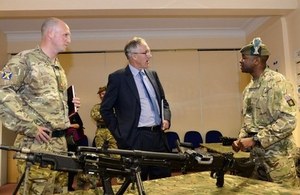Minister for Reserves visits troops in Edinburgh and Leuchars
Minister for Reserves Julian Brazier has spent the last two days meeting troops in Scotland.

The Minister is briefed on the workings of the General Purpose Machine Gun (GPMG) used by the Reservists of 6 SCOTS.
During his visit to Edinburgh and Leuchars, the Minister spoke to personnel from the Scots Dragoon Guards, 6SCOTS, 71 Engineer Regiment and 612 RAuxAF Sqn (Medical Reserves), about their experience in the military and discussed the current programme to strengthen the Army Reserve.
The Minister began his visit in Edinburgh, where he spoke to soldiers and officers from 6SCOTS about how growing the Reserves remains challenging but achievable. He went on to discuss what action was being taken to improve Reserves recruitment and the selection processes. Over the past year there has been a 115 per cent increase to new entrant enlistments in the Army Reserve.
Minister for Reserves Julian Brazier said:
I am delighted to have visited a number of units in Scotland and seen the brilliant work of both Reserves and Regular soldiers, like the Scots Dragoon Guards.
Reservists, including 6 SCOTS, 71 Engineer Regiment and 612 RAuxAF Sqn (Medical Reserves), are an integral part of the agile and flexible force we need to counter the wide range of threats Britain faces. The Armed Forces stationed in Scotland play a major role in our global reach.
We are proud that all three services have exceeded their annual trained strength targets for Reserves and continue to see a strengthening trend in Reserve recruiting.
He continued:
Scotland plays a vital role in defence of the UK. Our continued commitment to Scotland is demonstrated by our plan that by 2020, it will be home to all of the Royal Navy’s submarines, one of the Army’s seven Adaptable Force Brigades and one of three RAF fast jet main operating bases.
The Minister learnt of the varied backgrounds of 6SCOTS personnel. They are employed in a wide variety of civilian jobs, including mechanics, policemen, teachers and accountants, and come from the central belt of Scotland between Glasgow and Edinburgh, down to the Borders.
The infantry unit works world-wide alongside paired Regular unit 2SCOTS. Members of the unit went to Kenya on a challenging 6-week exercise involving live firing and patrolling in February. Some members are in now in Afghanistan for a four-month tour with 2SCOTS to support Officer training in Kabul.
Troops also highlighted how they make the most of the surrounding country to train. Some of the soldiers had just returned from adventure training in the Highlands of Scotland where they went rock climbing, mountaineering, kayaking and mountain biking. The mountains and Lochs around Kinlochleven provided the perfect conditions to test soldiers in a tough environment. They were pushed physically and mentally and developed their teamwork and discipline.
The unit told the Minister how some of them will spend next weekend practising their patrolling and low level combat skills in Dumfries and Galloway before spending two weeks conducting weapon firing, communication training, driver training and urban fighting skills in September.
Lt Col Garry Stimpson, Commanding Officer, 6 SCOTS, welcomed the Minister to their training night at their Edinburgh Army Reserve Centre. He said:
The Minister’s visit was an excellent opportunity to show him how we are integrating with our paired Regular unit 2 SCOTS, particularly on operations. We have Reserve soldiers deployed with their Regular counterparts in Cyprus and Kabul.
There has never been a better time to be in 6 SCOTS and it was a pleasure to brief the Minister on our busy and exciting programme.
The Minister then went to Leuchars to visit 71 Engineer Regiment and 612 RAuxAF Sqn (Medical Reserves). There he met with a wide range of NHS clinical specialists – from Consultants to Health Care Assistants. They already have the high level of clinical skills required, so their training is focussed on military skills and personnel development to prepare them for military deployment.